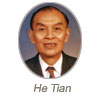| |
|
Wang Chen,was born in 1962 in Beijing, M.D., Ph.D., FCCP, professor in respiratory and critical care medicine. Dr. Wang received M.D. in 1985 and Ph.D. in 1991. Dr. Wang worked at Beijing Chao-Yang Hospital (1985-2010), where he served as Department Chair of Respiratory Medicine, vice president and president of the hospital. He was appointed vice president of Beijing Hospital of Ministry of Health in 2010. Dr. Wang has been serving as associate director of Beijing Institute of Respiratory Medicine since 1999. He also holds positions in national and international organizations including vicechairman of National Advisory Board for Management of Public Health Crisis; president of Chinese Thoracic Society; and vicechairman of Chinese Society of Critical Care Medicine.
Dr. Wang and his colleagues have built the first national network for pulmonary thromboembolism(PTE) prevention and management, and formulated the first guidelines for PTE diagnosis and treatment in China. These efforts have led to significant reduction of PTE mortality in China. Dr. Wang has also put great effort on searching for optimal management for this devastating condition. In a rigorous clinical trial, Dr. Wang and his team have provided compelling evidence that 50 mg (half of the recommended dose) tissuetype plasminogen activator can significantly reduce bleeding risk while maintain its effectiveness in PTE thrombolytic therapy. This new finding was published in CHEST and has been highly praised by experts in the field.
Dr. Wang is dedicated to improving the management of critically ill patients. In early 1990s, he established the first international standard respiratory intensive care unit in China. He has also developed a novel concept of “pulmonary infection control window.” Swtching from invasive to noninvasive mechanical ventilation within this window peroid can significantly decrease the ventilatorassociated pneumonia and mortality in patients with severe respiratory failure.
Dr. Wang is an expert in merging infectious respiratory diseases. During the 2003 SARS epidemic and the 2009 H1N1 pandemic in China, Dr. Wang served as the Director of the Medical Task Force. He and his team promptly established a national network and developed guidelines for surveillance, diagnosis and treatment of these diseases. These measures had led to effective control of the spread of the diseases. During these crises, Dr. Wang also led National Clinical Investigation Groups and collected valuable information in epidemiology, clinical manifestation and pathogenic mechanisms of these emerging infectious diseases. One of the findings from these studies was published in New England Journal of Medicine.
Smoking is a severe public health problem in China. Dr. Wang has devoted to tobacco control since he was a young physician. He is currently the director of the WHO Collaborating Centre for Tobacco or Health in China, vice chair of the Chinese Association for Tobacco Control. He has launched nationwide campaigns for quitting smoking among health professionals and creating smokingfree hospitals. He has opened the first smoking cessation clinic, estabolished national QUITLINE, published first guideline and enforced national training programs on smoking cessation. He has conducted many smokingrelated studies.
|
|






